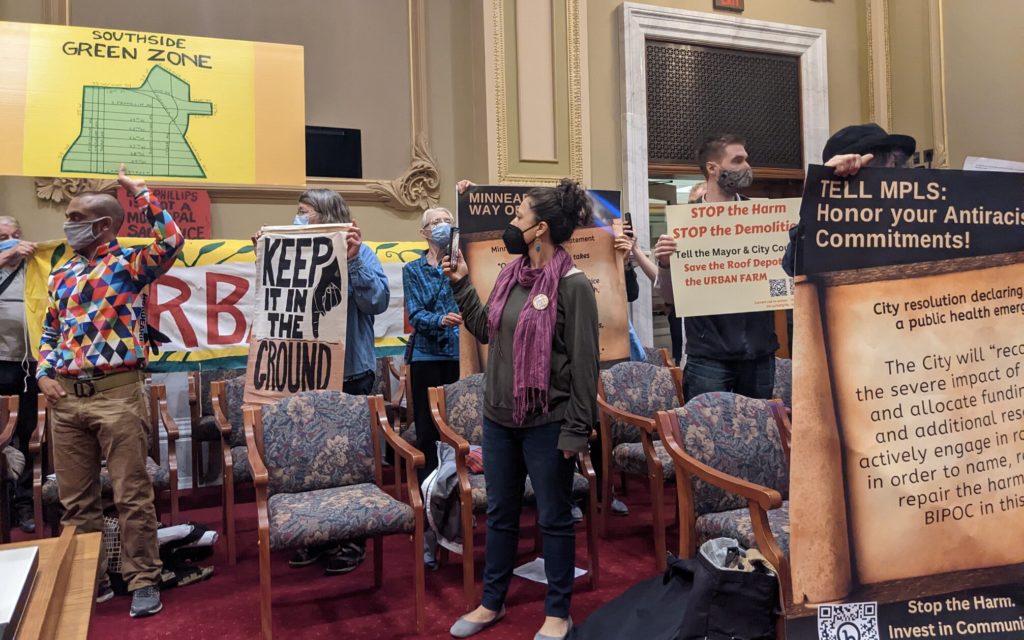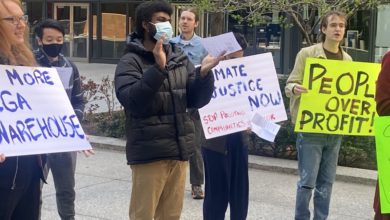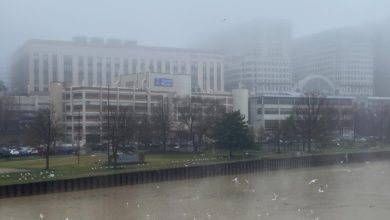Residents of the Phillips neighborhood in Minneapolis are fighting back against the proposed demolition of a local building by Mayor Jacob Frey and the Minneapolis City Council.
The city plans to demolish a disused building in the neighborhood to make room for a planned expansion of a public works facility located across the street. Residents, being represented by the East Phillips Neighborhood Institute, have been opposing this plan for over eight years, citing environmental, pollution and community-related concerns. These concerns, however, have not been addressed as the mayor and city council have made it exceedingly difficult to have an open discussion about this issue. Support from council members Jason Chavez and Robin Wonsley has provided Phillips residents with a limited dialogue with the city, but many promises given to them remain broken or unfulfilled.
“We are fighting for the council to not authorize the demolition of the Roof Depot building,” Steve Sandberg, a Phillips resident and a member of the East Phillips Neighborhood Institute, explained to Liberation News. “It’s a warehouse that we have plans for and they’re trying to tear it down.”
Environmental racism
Phillips is a diverse neighborhood located directly south of downtown Minneapolis. Like many neighborhoods in the city, especially majority Black, Indigenous or immigrant neighborhoods, it has a high rate of pollution and environmental decay in comparison to more affluent neighborhoods. The Minnesota Center for Environmental Advocacy described the air quality in Phillips as some of the worst in Minneapolis. In the Little Earth of United Tribes, a Housing and Urban Development-subsidized housing complex — the only of its kind in the country with preference towards Indigenous residents — rates of heart, lung and neurological conditions from pollution are disproportionately high by Minneapolis standards.
The demolition being proposed by the city would only exacerbates this problem. The building, formerly known as the Roof Depot and located at East 28th Street and Longfellow Avenue, lays on top of an arsenic plume. Were it to be demolished, this arsenic would spread into the soil, the homes and most critically, the bodies of Phillips residents, poisoning their community even further. This blatant disregard for the safety of oppressed communities at the hands of its liberal administration comes as no surprise, with Minneapolis having some of the most pronounced racial disparity in the country.
Save the Roof Depot
Desperate to protect their community, the residents of Phillips have been pleading with the city to reverse its decision. They made a proposal to keep the building standing, repurposing it into a community center with space for affordable housing, markets, farms and other initiatives designed to foster community cohesion and create green jobs in the area.
Despite their thorough plan, with assurances from architectural experts such as Dean Dovolis — himself the president of the East Phillips Neighborhood Institute — that the building is in fact safe to use, the city has continually ignored the data presented to them, preferring instead to railroad their decision through with little regard for safety or the democratic process the citizens of Minneapolis are entitled to.
“Initially, [the mayor] told the city council that they were going to repurpose the building. The demolition wasn’t even in their plans,” Steve Sandberg said. ”City council voted 8 to 5 to find another site, and yet the mayor vetoed it, and now the council is siding with the mayor. This is the kind of stuff that we’re up against.”

Promises broken
The struggle undertaken by the residents of Phillips is made all the more difficult by disregard for them by the Minneapolis City Council and Mayor Jacob Frey. In June, the mayor invited members of the community to discuss the future of the project. However, later in the same month, a decision was approved to move forward with the plan to demolish the building.
Despite overtures of a desire for an honest dialogue, the mayor and the city council have repeatedly pushed back any opportunity for such a thing to occur, instead preferring to obfuscate and obstruct residents from pursuing any means to actually oppose this plan.
“They haven’t been willing to negotiate with us or meet with the neighborhood,” Sandberg told Liberation News. “They make promises but never follow through … The city needs to live up to their minimum promises. They need to stop blowing smoke and pretending that they’re solving our problems when they haven’t even consulted us.”
Just this week, members of the community have sat in at multiple city hall meetings, only to be told each time that their opportunity to speak would be at the next meeting. This is not an unexpected tactic. However, it has not stopped residents from returning daily to make their voices heard.
“This isn’t just procedure, this is a legally binding act to demolish a building that the community has not consented to. We are here to say ‘NO,’” shouted one impassioned member of the community to the city council at the meeting on Thursday.
“What were you all elected for?” another resident incredulously asked them. “If you’re not going to keep us safe, you need to tell us how we can keep ourselves safe. Are you going to stop killing us, or are you going to continue to use colonialist resources to call us criminals?”
Despite these pleas, the members of the community who showed up to have their voices heard on Thursday were met with malice and dismissal from members of the city council. Mayor Jacob Frey, there for all of 10 minutes for a photo-op, was nowhere to be seen when community members called for him.
Even more disrespectful were the actions of Council President Andrea Jenkis who, along with other members of the council, got up from her seat and left the room as soon as the community began to make their voices heard. She then adjourned the meeting to restart three hours later, putting further strain on the working-class residents of Phillips who have to take time away from their jobs and their families in order to attend these hearings.
When the meeting resumed, the council voted to continue to go forward with their outline for demolition, despite the evidence presented by community members in opposition to this plan. Even more disrespectful was the sudden appearance of Mayor Jacob Frey — absent from the vote itself — on the steps outside city hall following the forceful removal of protesters from the council chamber under threat of arrest. Mayor Frey called the residents of Phillips liars directly to their faces, and outright rejected their insistence that the project presented genuine danger to the people who lived in the surrounding areas.
Like in 2020 following the murder of George Floyd, the citizens of Minneapolis are not accepting this injustice sitting down. The struggle continues, and until their safety and quality of life is guaranteed by the people who supposedly represent them, the residents of Phillips and Minneapolis as a whole will stand up and fight back.
Feature photo: The City Hall building in Minneapolis. The city plans to demolish a building in the Phillips neighborhood despite public opposition. Liberation photo






